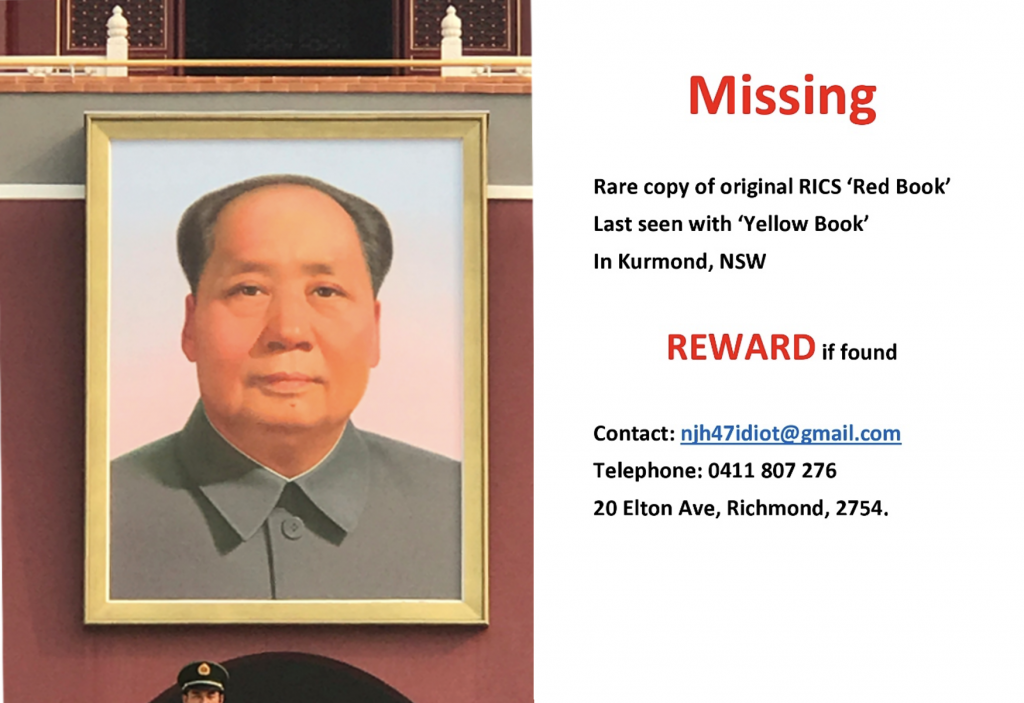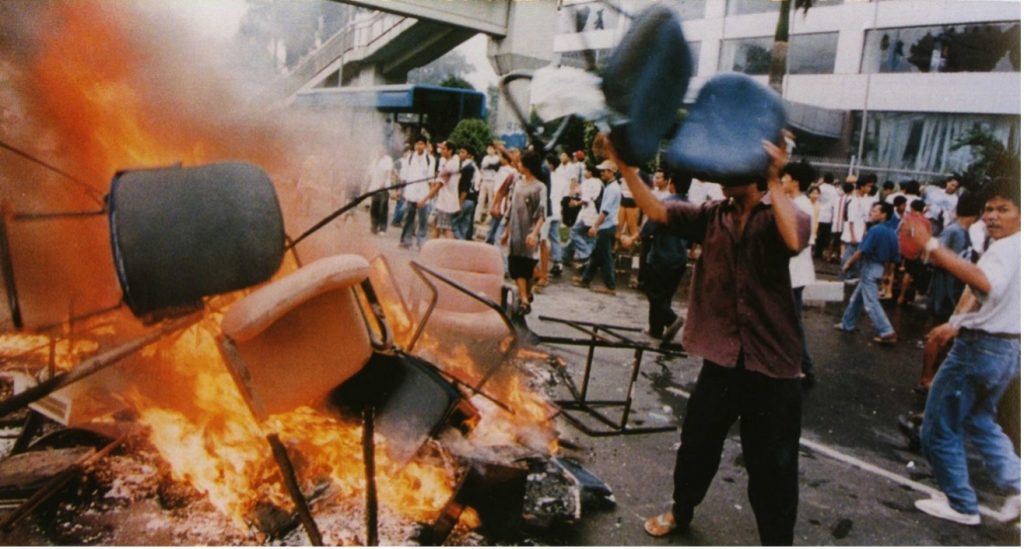In this very special series of exclusive articles for the Property Chronicle, Australian property legend Norman Harker reflects on his extraordinary 50-year life in real estate. He will pull no punches partly because, as he freely admits, Norman has a limited life expectancy of five years from December 2018 due to a diagnosed terminal blood cancer, which he has cheerfully accepted in preference to (in his words) “kicking the bucket without notice”. We are honoured he has chosen us to publish these brilliant, funny and incisive reflections of a lifetime in property.
Chapter 11: Out of chaos came order – the evolution of the Red Book
Way back in chapter six, I rambled on about our firm having to create its own practice standards. Here I’ll divulge how and why the RICS (aka ‘chartered chappies) practice standards came about.
The least liked philosopher is without doubt Friedrich Wilhelm Nietzsche. This is because no one can spell or pronounce his name. While he was learning to write his name, he wrote the book Also Sprach Zarathustra: Ein Buch für Alle und Keinen – translated into English as Thus Spoke Zarathustra: A Book for All and None – probably the least riveting book title ever conceived. Going back to chapter six, you’ll see Nietzsche also had that much prized (by me, anyway) attribute, a moustache.
And buried in that book is the clue to why the chartered chappies’ practice standards were developed. Subsequent writers with more easily spelled and pronounced names have paraphrased the Nietzschen assertion that “one must face chaos to give birth to a star” as “out of chaos comes order”.
Nietzsche… out of chaos comes order

But…
The great property boom from 1945 onwards finally imploded in early 1974 due to the effects of the Yom Kippur War of 6–25 October 1973, which put the British economy up the proverbial watercourse without a means of propulsion. The market froze for nine months, there were numerous bankruptcies, banks and other lending institutions became unsound and there was a total loss of faith in the valuation professions led by the chartered chappies from their orifice just round the corner from Parliament Square.
Then out of the chaos came order – and it was all done here, the home of the chartered chappies

A perceptible contrast with my office during the property crash of 1974
To address this loss of credibility and in fear of the wrath of the occupants of parliament just around the corner from them, the RICS convened a meeting of the leading heads of valuation practices. My new head of department had acceptable table manners and was accordingly invited, despite our firm being a recent upstart.
Over dry sherry it was decided that what was needed were practice standards. In true committee style, instead of “RICS Practice Standards” they came up with “Guidance Notes on the Valuation of Assets”.
This was too long and difficult a title for valuers to say between beers. They noted the bright red cover, and being devout followers of Mao Zedong (who had one too), they called it “the Red Book”.
Mao Zedong had his red book… We had an English translation of it

At that time, I was on the umpteenth version of a preface letter that covered our firm’s valuations of client companies’ assets for balance sheet purposes. I had continued developing this document from that created with my previous head of department over hours of discussion – on one occasion late into the nights of a family holiday in Jersey.
By a process of telepathy, large chunks of that umpteenth version of our preface letter appeared in the Red Book, and valuers were given an amazingly simple choice: Comply with the Red Book or lose the right to be a chartered chappie.
In 1981 the RICS were instrumental in setting up the International Valuations Standards Committee. This committee formed the International Valuation Standards Council, which publishes the International Valuation Standards. These are now incorporated in the standards of an ever-increasing number of countries.
The acorn of the Red Book has grown into the mighty oak of the IVS.
A better example of “out of chaos come order” in the context of practice standards was the case of Indonesia in the aftermath of the 1997 South East Asian economic crisis. And, of course, I got dumped up to my neck in muck and bullets in that one.
I was sent off to Jakarta with just seven days’ notice, in the full expectation, on the part of both the university and myself, of my death or abject failure
In 1999/2000, the World Bank was looking for someone to assist Indonesia in developing valuation practice standards and a code of ethics. There were riots on the streets of Jakarta. The unresolved economic crisis had led to an unresolved political crisis, which in turn had produced a social crisis with students leading increasingly violent demonstrations.
Jakarta was not then exactly favoured by western valuers as a place to experience the ‘year 2000 problem’, but my bosses volunteered my services.
Just the place to send Norman!

My employers then were the University of Western Sydney (UWS), now called Western Sydney University (WSU) – no doubt later they will adopt another of the four remaining permutations of those three letters. But only after spending a fortune in consultancies and signs and paperwork, right down to logo-featuring toilet tissue.
At last! They had found a way of getting rid of me. I was sent off with just seven days’ notice in October 1999 in the full expectation, on the part of both the university and myself, of my death or abject failure.
To make life really interesting and with the hope that I would be locked up for debt, UWS/WSU forgot to ensure that my hotel bills were paid and that I had access to cash. They ‘closed up shop’ from Christmas Eve until after New Year. But they didn’t know I had an American Express card and that my bank in Australia trusted me to sort things out on my return.
So, luckily, I only got to see the ‘Jakarta Hilton’ from the outside.
The ‘Jakarta Hilton’

I took the Red Book, the Appraisal Institute of America Standards, and the International Valuation Standards. I adopted the ‘man from Mars’ approach and created a purpose-led set of standards and complementary guidance notes, starting at instructions and finishing with the report. After almost endless discussions, the Indonesian valuers, with government support, joined the International Valuation Standards Council, and that formed the basis of their standards. A much better solution to their problem.
The code of ethics was even easier: I told the Indonesian valuers that I couldn’t write it! All I could do was say how other countries did it and put words to their decisions on how they wanted to do it. They’d previously been advised by someone who told them what they must do. Their reaction was like they’d just recovered from acute constipation. We got on well at after-sunset ‘break fast’ meals, thus proving you can work normally during Ramadan.
In mid 2000, I was invited to the official launch of the Indonesian code of ethics and gave the keynote address. My major faux pas of that address was to point to the next step of enforcement. That was then a completely novel concept.
Always at a loss for new material for my students to doodle on, I incorporated all my documentation into my lecture materials. This included my earliest feeble attempt at coming to grips with a discounted cash flow guidance note, which I had drafted but didn’t complete or give to the Indonesians.
Somehow, these notes of mine were substantially incorporated in an Australian Property Institute (API) draft guidance note on discounted cash flow. By the time that was published, my views had changed from recommending impossibly complex prescription to that of description and justification of approach. After informally advising the API of inadequacies, huge numbers of corrections and additions, and impossibility of compliance, the draft guidance note was given a quiet funeral.
At least that funeral wasn’t mine!
Image credits: rics2 (image of Great George Street); Ge Xiaoguang (image of Mao Zedong).







